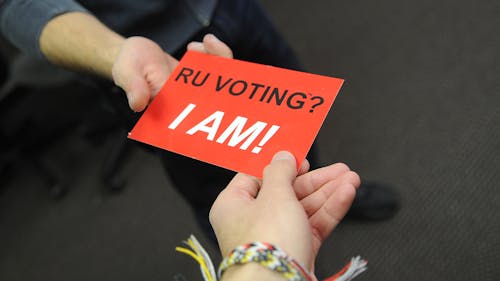Rutgers Eagleton program supports political involvement

The Youth Political Participation Program offered by the Eagleton Institute of Politics is offering numerous opportunities for students to get politically involved, no matter what major they come from.
The Institute on Douglass campus offers many projects. The main three are RU Voting, RU Ready and the Young Elected Leaders Project, as well as other opportunities to learn more about the ins-and-outs of the political realm.
Active citizenship requires a combination of political knowledge, skills and democratic attitudes. The program is motivated by the urgency of conveying these essential ingredients of good citizenship to young people, according to Eagleton’s information booklet.
Elizabeth Matto, director of the program and an assistant research professor at Eagleton, said her mission as a political scientist is not just to teach young adults the theory of political participation but to offer them opportunities outside of the classroom to put what they are learning to practice.
“We do a number of research programs, public service programs, educational programs and we’re on a college campus, and so whenever possible, we like to weave into all of our work opportunities for students … to get hands-on experience,” she said.
RU Voting, one of the largest initiatives at the Eagleton, teaches students how to register others to vote and to set up their own registration drives, she said.
Oluwadamilola Onifade, a School of Arts and Sciences junior, was introduced to the program and RU Voting through a Byrne seminar that she took as a first-year student and soon became the program’s student coordinator.
“Through (RU Voting), our goal is to register Rutgers students to vote, get them to the polls and to keep them involved,” she said in an email.
Onifade has also been working on a project called "RU Talking to Me?" which deals with the extent that politicians are addressing the millennial generation. The project truly puts into perspective the role of the millennial generation in terms of voting power, she said.
The program also offers the Young Elected Leaders Project, which studies young adults 35 years old and younger that are serving in office, Matto said. The project studies the genders and demographics of the young leaders, and surveys them to further break down the demographics.
“The millennial generation is seen as the most ethnically diverse generation, and looking at the offices, do they reflect the demographics of the generation?” she said.
Constance Capone, a School of Arts and Sciences junior and secretary on the executive council of the Rutgers University Student Assembly, became involved with the program after participating in the Darien Civic Engagement Project.
The Darien Civic Engagement Project is a 1.5 credit-per-semester program held at Eagleton and centered around engaging youth in politics, she said.
“In the Darien Learning Community, our first semester was all about RU Voting, in which we held voter registration drives and registered hundreds of students,” she said in an email. “In the RU Ready program (in the spring semester), we collaborated with New Brunswick High School and taught 90-minute sessions to students on the importance of civic engagement.”
Millennials are the least likely group to come out and vote, yet they encompass the largest generation, she said. The various programs at Eagleton stress the power of the youth electorate.
The Youth Political Participation Program, through RU Ready, disseminates the Eagleton's message and mission to New Brunswick High School, to equip and encourage high school students to think about politics and the role it plays in their lives, the role that they play in politics, Matto said.
Eagleton is also piloting an initiative named RU Running, which will be a campaign-training program for college students.
They will be partnering with the League of Women Voters of New Jersey and launch the pilot at the end of March and hope that the Rutgers students that participate give good feedback to improve the program not only for Rutgers students, but so it could be used as a template for other colleges, Matto said.
“We are all going to be citizens and members of a community, so what I think is so important about the YPPP is that it offers opportunities not only for political science majors,” Matto said. “It is an education in citizenship … that should be important not only to political science majors, but students of all disciplines.”
Eagleton’s website offers information pertaining to every program, as well as information for Rutgers—Newark and Rutgers—Camden students to keep all students informed and opportunities to get involved.
“I think we have a theme here that politics matters,” Matto said. “Politics is important to your life, and it will intersect with your life no matter what your profession is.”
___
Alexandra DeMatos is a School of Arts and Sciences sophomore double-majoring in journalism and media studies and political science. She is the copy editor of The Daily Targum.



